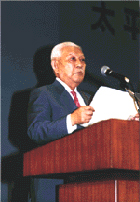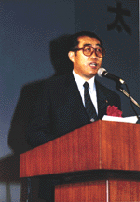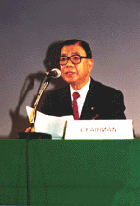

Ryoichi Sasakawa
Honorary Chairman
The Sasakawa Peace Foundation
It is a great pleasure for all the staff of the Sasakawa Peace Foundation to be able to open this, the Pacific Island Nations Conference, attended by representatives of ten countries and eight associates from the Pacific island region, and all the other distinguished participants here today.
I would like to express my heartfelt gratitude to all of those government officials and others concerned for their assistance and cooperation in making this great Conference a realization. It is my sincere hope that through fruitful discussions and exchanges of views among the participants, this Conference will be able to set hopeful targets for the future of the Pacific Island Nations, become an important basis for the development of the whole region, establish a bond of friendship among all these nations, as well as between them and Japan, and contribute to world Peace.
Therefore, I declare the opening of the Pacific Island Nations Conference.

Presented by Keizou Obuchi
Minister of State, Chief Cabinet Secretary
It is with great enthusiasm that I express my congratulations on the opening of the Pacific Island Nations Conference sponsored by the Sasakawa Peace Foundation and attended by a wide range of leaders from the Pacific Island Region.
The 21st century has been termed the "Pacific Century." The nations of the Pacific Island Region hold great potential across a broad spectrum of political, economic, and cultural endeavors. As, in recent years, the world's attention in this region has risen, this is indeed a good time for the leaders responsible for the future development of the region to gather together in Japan, a fellow island nation of the Pacific, and strengthen the bonds between themselves through an open and free exchange of ideas. As a member of the Asia-Pacific community, Japan has followed a basic policy of contributing to peace and prosperity in the Pacific Island Region by strengthening friendly and cooperative relations with the region. Thus, Japan has worked to promote mutual exchange and understanding between itself and these island nations through a variety of ways, such as promoting political dialogues, expanding Official Development Assistance, and developing mutual exchanges and understanding, including cultural and human exchanges. Japan is currently developing an "International Cooperation Initiative," which is focused on building a "Japan which contributes to the prosperity of the world." Through activities based on this scheme, Japan shall continue to work for peace and prosperity in the Pacific Region.
Nevertheless, to achieve deeper mutual understanding and create lasting relations of friendship and trust between the peoples of our nations, we will need to extend our efforts beyond promoting cooperation and exchange between governments, and commit ourselves to cultivating cooperative and friendly relationships in every sector and at every level of our societies. Therefore, I find it most significant that it is the Sasakawa Peace Foundation, a private organization, which has convened a conference of this nature today, and I express my appreciation to this Foundation for its initiative.
Against the background of diverse cultures, histories, economies and societies, a variety of issues and problems have been building up in the Pacific Island Region. It is my hope that this conference will serve as a forum for discussing these issues in earnest, and a place for generating ideas and proposals to cope with these problems and assure the future prosperity of the region. I sincerely hope that this conference will bear the fruits of deepened mutual understanding.
Finally, I pray for the success of this conference, and the health and happiness of each of you here today. Thank you so much for your kind attention.

Tadashi Kuranari
Member of the House of the Representatives
Former Minister of Foreign Affairs
It is a great pleasure for me to be able to make a few remarks at the opening of this Conference. It is also a great honor for me to serve as chairman. We all gather here today heavily indebted to the Sasakawa Peace Foundation, which has made possible this meeting. This meeting is unique, I believe, in a number of ways: First, it is unique in that, despite its unofficial character, it has secured a high-level of participation from the governments of this region. Consequently, I am convinced the meeting could well serve as a wise men's group whose opinions are simply too important to be dismissed.
Secondly, it is unique because such an unprecedented number of leaders of this region have come to Japan at one time to discuss issues of mutual concern. I take this as a sign that Japan has become a much closer neighbor to all of you. Modern technology has overcome the geographical distances of the Pacific Ocean which were once seen as an insurmountable hindrance to human communication. Now, in order to solve one's problems, one needs advice and cooperation from others. This kind of help has often been obtained at such meetings as this.
Thirdly, this meeting is a unique endeavor at a time when the South Pacific Forum increasingly recognizes the need to strengthen dialogue with nations outside of the region. Japan, when I was the Foreign Minister last year, took the initiative of opening a dialogue with the Chairman of the Forum right after its meeting. This Conference supplements those efforts that were made at the government level. In this context, this conference turns a new page in Japan's relations with the region by demonstrating that the private sector in Japan can also act as an interlocutor with the Pacific island countries.
Today, the Asian and Pacific region is witnessing a tremendous change in its political, economic and strategic dimensions. Perhaps these changes are so fundamental that an often-cited prediction could soon become reality: "The 21st century is the century of the Pacific region." There is every ground for such a forecast to come true. America's increasing reliance on the Asian & Pacific region, Japan's dramatic growth, China's modernization efforts, Gorbachev's initiative in the Pacific, and the growth ladder of the so-called Asian NIES nations and China in following Japan's path: these have combined to enable Asia and the Pacific to be the most dynamic part of the world and, therefore, to hold the key to the next century.
However, it is also true that the future will not be bright and just if our Pacific island neighbors in the region are not able to fully benefit from the political and economic changes sweeping the Pacific rim nations. If these island nations are left behind in the dynamic process of change due to fragile national bases, which has been the case sometimes in the past couple of years, then it will be most unfortunate for the entire region and particularly for Japan whose own survival hinges upon the stability and prosperity of her neighbors.
It was this recognition which prompted me to take a trip to the South Pacific as Foreign Minister in January of last year. My speech in Suva marked the first time for Japan to reveal its overall policy towards the Island Nations. The viability of the principles I outlined in that speech has been well tested since then.
Japan stands ready to assist in the development efforts of the Island Nations. In doing so, Japan will always respect the autonomous initiatives of these nations. This is the thrust of the principles I put forward then. The Takeshita government, which came into office last November, continues to maintain this policy. In his recently announced "International Cooperation Scheme," which includes yet again a doubling of Japan's ODA in five years, assistance to the Pacific island countries will now receive fresh and reinforced emphasis.
Having said that, however, Japan's growing involvement in the region came about only recently, motivated by the growing sense of international responsibility commensurate with her economic strength.
Inevitably, within the broad framework of the Suva speech, Japan still finds herself in a trial-and-error process in her dealings with the region. This may continue for some years to come. This is exactly why this type of dialogue with the island leaders is essential to us. We can learn more from them about their potentials and their problems. Likewise, consultations with metropolitan leaders are also useful since these people possess vast experience and expertise in developmental problems which may be useful to the Island Nations.
You are the navigators who will guide Japan's future role in the Pacific.
I earnestly hope through candid and friendly exchanges during these two days of meetings, that we can identify areas of cooperation, political economic or otherwise, between your countries and mine.
In conclusion, I, as one who has devoted himself to furthering the ties between us, have been looking forward to this meeting. Such an occasion as this provides an excellent opportunity to strengthen personal ties among the participants, to establish good personal relationships based upon mutual trust, and this, in turn, is the best guarantee of peace and stability in any part of the world.
Japan, which is located way up here on the northern half of the globe, has not had the benefit of high-level meetings like this with the leaders of the Pacific Islands in the past. I do believe that by the end of the meeting, all of us will have made genuine friendships in your part of the globe. Now that my opening remarks are over, I would like to touch upon some of the procedural aspects of this Conference.
The Conference is an informal one, so we have no intention of issuing a declaration or communique at the end. But as Chairman, I will attempt to summarize the entire discussion at the end, and at the Press Conference, which is scheduled late tomorrow afternoon, I will make the Chairman's summary available to the Press Corps in Tokyo.
Regarding the agenda of the Conference, as we see in the program, the first session will provide an opportunity for the chief delegates to present their prepared statements.
The second session is on the socio-economic development of the Pacific Island Nations. Each delegate will be invited to speak on the subject. And if time permits, we will have a free discussion afterwards.
The third session, which will be held tomorrow morning, will have a different seating arrangement to allow a free and frank exchange of views among the participants. Not only the delegates of island governments but also associate members of the Conference will be welcome to take the floor. The session will be about Japan's possible role in the South Pacific, governmental and non- governmental.
If there are no objections, the agenda as listed in the program will be adopted.